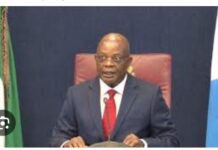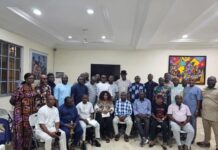LAGOS, Nigeria — In a blistering statement that has reverberated across Nigeria’s social and political landscape, Charly Boy Oputa, the renowned Nigerian entertainer and social commentator, has publicly challenged President Bola Ahmed Tinubu’s claim of inheriting a “dilapidated” nation from his predecessor, Muhammadu Buhari. The outspoken critic meticulously dissected Tinubu’s administration, highlighting a series of lavish expenditures that starkly contradict the President’s portrayal of Nigeria’s economic state.
Outspoken Charly Boy Oputa has publicly challenged President Bola Ahmed Tinubu’s claim of inheriting a “dilapidated” nation from his predecessor, Muhammadu Buhari. August 13, 2024.
This incisive critique has not only captured the attention of the masses but has also sparked a renewed debate on the priorities and fiscal policies of Nigeria’s current government. As the nation grapples with economic challenges, Oputa’s words resonate deeply, urging a critical examination of the alleged extravagance under Tinubu’s watch.
The President’s Claim: A Dilapidated Nigeria?
In his statement, President Bola Ahmed Tinubu asserted that he inherited a crumbling nation—economically and structurally—from the former President, Muhammadu Buhari. This claim has been the foundation for many of Tinubu’s policy decisions, including the controversial removal of fuel subsidies and the increase in electricity tariffs, both of which have been met with widespread criticism and hardship for ordinary Nigerians.
However, Charly Boy’s recent post directly counters this narrative, arguing that Tinubu’s actions since assuming office tell a different story. If Nigeria were truly dilapidated, Oputa questions, how could the President justify the extravagant spending that has characterized his administration thus far?
Extravagant Expenditures: A Breakdown
Oputa’s post methodically lists a series of expenditures that paint a picture of a government out of touch with the realities faced by the average Nigerian. The following are some of the most striking examples:
21 Billion Naira to Renovate the Vice President’s House: This massive allocation raises eyebrows, especially when juxtaposed with the President’s claims of inheriting a financially-strapped nation. The Vice President’s residence is a symbol of the administration’s priorities, and such an enormous sum for renovations seems unjustifiable in a time of economic crisis.
70 Billion Naira for SUVs for National Assembly Members: The provision of luxury vehicles to senators and House of Representatives members at an estimated cost of 160 million Naira per vehicle has drawn sharp criticism. This expenditure, Oputa argues, underscores the disconnect between the government’s rhetoric and its actions.
4 Billion Naira to Renovate Dodan Barracks and 3 Billion Naira for Aguda House: These sums allocated for the renovation of military and governmental residences further illustrate the government’s penchant for spending on the elite at the expense of the general populace.
5 Billion Naira to the Presidential Tax Reforms Committee: Headed by Taiwo Oyedele, this committee’s results have been underwhelming, leading many to question the necessity of such a significant budget for a group of fewer than twenty individuals.
1.5 Billion Naira for Cars for the First Lady, Senator Oluremi Tinubu: The office of the First Lady is not constitutionally recognized, yet it enjoys significant funding. This allocation, according to Oputa, is another example of the government’s misplaced priorities.
300% Salary Increase for Judges: This salary hike, swiftly passed by what Oputa describes as an “insensitive and irresponsible” Senate, contrasts sharply with the economic realities faced by ordinary Nigerians.
5 Billion Naira for the Presidential Fleet: The allocation for new vehicles for the President is yet another instance of questionable spending, especially given the administration’s claim of inheriting a financially-strapped government.
Billions Budgeted for a Presidential Yacht: In a country where many struggle to afford basic necessities, the budgeting of funds for a luxury yacht is particularly egregious.
Billions for Presidential and Vice Presidential Trips: The cost of international and domestic trips for President Tinubu and Vice President Kashim Shettima has been a subject of controversy, with many questioning the necessity of such expenses in a time of national hardship.
Exorbitant Salaries for Senators and House Representatives: Oputa highlights the fact that each senator earns 21 million Naira monthly, while House of Representatives members take home 13.5 million Naira. This, he argues, is a gross injustice in a country where many live below the poverty line.
15 Trillion Naira Lagos-Calabar Coastal Road Award: Perhaps one of the most controversial points, Oputa alleges that this massive contract was awarded illegally to Gilbert Chagoury, a Lebanese businessman with close ties to Tinubu. This accusation, if true, would raise serious questions about the transparency and legality of the administration’s dealings.
Creation of the Ministry of Livestock Development: The establishment of this new ministry has been met with skepticism, particularly given the government’s failure to implement the Oronsaye report, which recommended downsizing and merging various agencies, parastatals, and departments.
The Subsidy Question: Where Are the Savings?
Oputa also calls out the government’s handling of the fuel subsidy removal, a policy that has caused widespread pain across the country. The removal was justified as a necessary step to save money and invest in critical infrastructure, but Oputa demands transparency regarding how much has been saved and where these funds have been allocated.
“Where is the subsidy money that was removed on petroleum products and electricity? How much was saved, and what was the money used for?” Oputa asks, echoing the concerns of millions of Nigerians who feel increasingly betrayed by a government that promised change but has so far delivered little more than increased hardship.
The Cost of Governance: Rising, Not Falling
Despite promises to reduce the cost of governance, Oputa’s post highlights how government expenses have, in fact, increased under Tinubu’s administration. From the maintenance of an extensive presidential fleet to the extravagant allowances paid to government officials, it is clear that the burden of these costs is being borne by ordinary Nigerians, who see little benefit from these expenditures.
Oputa contrasts the government’s spending with the suffering of the Nigerian people, who are facing skyrocketing prices for fuel, electricity, education, health services, and food. Unemployment remains high, insecurity is rampant, and the economy is in a state of collapse. In this context, the lavish lifestyle of the country’s leaders is not just insensitive—it is an affront to the very people they are supposed to serve.
Renewed Hopelessness: The Legacy of Tinubu’s Administration?
Oputa’s statement culminates in a damning indictment of Tinubu’s leadership, describing it as a period of “renewed hopelessness, destitution, and deception.” Far from the “Renewed Hope” that Tinubu promised during his campaign, Oputa argues that Nigerians have been subjected to a governance style that prioritizes the enrichment of the elite over the well-being of the masses.
He points out that while the leaders grow richer, ordinary citizens are sinking deeper into poverty. The President’s physical, mental, and financial transformation since taking office, Oputa suggests, has come at the expense of the Nigerian people.
The Call to Action: Arresting the Trend of Insensitivity
“This trend must be arrested,” Oputa declares, calling on Nigerians to hold their leaders accountable for their actions. His message is clear: the extravagant spending and insensitivity to the plight of ordinary Nigerians cannot continue unchecked.
Oputa’s post has already ignited a firestorm of reactions, with many Nigerians echoing his sentiments and demanding greater transparency and accountability from their leaders. The question now is whether President Tinubu and his administration will heed these calls or continue down a path that many see as increasingly out of touch with the realities facing the nation.
Conclusion: A Nation at a Crossroads
As Nigeria stands at a critical juncture, the issues raised by Charly Boy Oputa cannot be ignored. His critique is not just a personal opinion—it reflects the growing frustration and anger of millions of Nigerians who feel abandoned by their government. The question is whether the Tinubu administration will address these concerns or continue to dismiss them as the grumblings of a discontented few.
In the coming days and weeks, the response of the Tinubu administration to this latest criticism will be closely watched. Will they continue to defend their actions and spending, or will they take steps to align their governance with the needs and expectations of the Nigerian people? Only time will tell.
For now, one thing is clear: Charly Boy Oputa has once again proven himself to be a voice for the voiceless, a tireless advocate for justice, and a relentless critic of the powers that be. His latest post is a clarion call for Nigerians to stand up and demand better from their leaders—a call that, if heeded, could mark the beginning of a new chapter in Nigeria’s troubled history.











